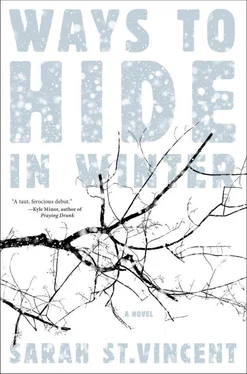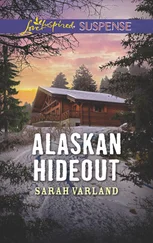I held this other receiver in my hand, feeling its weight.
Then I pushed my coins into the slot.
I didn’t know the number for the police, I realized as I looked at the keypad. But I could call the park office, where the rangers worked. That would be enough; after all, the park was their territory.
I pressed the numbers and waited for the ringing. There was a click as someone picked up.
“Hello,” a woman’s voice said on the other end of the line.
I gathered myself. “Hello,” I said.
“You’ve reached the office of Pine Grove Furnace State Park in Gardners, Pennsylvania,” the voice continued. “Please leave—”
I cursed under my breath and hung up. After a moment, I tried again.
“Hello,” the same woman’s voice said.
I sighed.
“Excuse me?” the woman said.
“Oh—” I gripped the receiver with both hands. “Sorry. I, um…is there someone I could talk to about…uh, somebody in the park?”
“Somebody in the park?” she repeated. “Are you having a problem at the campsite?”
“No, it’s—something else.”
“Well, tell me what you need and I’ll tell you if we can deal with it.” Her tone was impersonal and professional, her accent slightly southern.
“It’s kind of hard to explain. I wanted to…to report someone.” The word “report” had a jarring sound as it fell from my mouth, and I squeezed the cord in my hand.
“Okay,” she said, apparently unfazed. “What are they doing?”
“Well, it’s not something they’re doing, exactly. They did something before, in the past.” As I spoke, I saw the stranger’s face, with its hollow cheeks and fine lines. “People are looking for them.”
“I see.”
I could picture her leaning back in her chair and tapping a pencil, as if she had just realized she was talking to someone who had a screw loose.
“What I mean is…” I paused. The metal keypad was covered with fingerprints, traces of other people who had wound up here, using this thing in a trash-strewn corner as the cars outside rushed by. The broke and broken-down.
“Ma’am?” the ranger said.
“Yes—sorry.”
“Can you tell me what this person looks like?”
I steeled myself.
“Tall,” I said. “Thin. He has black hair.”
“Caucasian?”
I had never thought about it. “Um…yeah. I guess so.”
“How old is he?”
“Thirty-nine. Maybe forty by now.”
“And how much would you say he weighs?”
The stranger hovered before my vision again. Hat in hand, eyes calm and gentle. A distinct feeling of self-loathing began to creep over me.
On the other end of the line, the ranger sighed. “Listen, ma’am, if you’re not—”
I hung up.
There was a picnic table outside, and I sat down on one of the wooden benches, listening to the roar of the traffic. Car after car, truck after truck. Other lives.
The ground shook as each of them passed, endlessly.
I looked down the hill, where a muddy path led nowhere, ending at a barbed-wire fence and a row of trees.
The lines in the photographs, I thought. The ones that came from whipping. If they had been less vivid, if they had healed, they would have looked just like the pink lines on the stranger’s back.
I tried to remember exactly what I’d just told the ranger, how much I’d given her to go on. It hadn’t been much, I thought. There was still time to reconsider, to decide what to do. Tall, thin, dark hair, about forty. That could be anyone. They wouldn’t pursue this; they’d think I was just some crank. Wouldn’t they?
My mouth and nose burned with the fumes from the interstate. I pressed my hands against my knees, looking down at them, feeling the table tremble. I am the wrong person for this, I thought. Every time I think I understand it, every time I’m sure, it slips away from me. Tell me what to do. Tell me what to do.
The traffic rushed on.
I woke up the next morning with my jaw aching, having clenched my teeth together as I’d slept. The buggies went by on their way to somewhere. My grandmother poured herself a glass of water. I sat up slowly and pushed aside the afghans.
I’d retrieved my suitcase from the hostel the day before, slipping in and out without anyone seeing me. I hadn’t told Martin what I’d done. I hadn’t told anybody.
I showered and tied my hair into a knot, noticing that I was losing weight. The scars stood out as starkly as ever, but I ignored them, pulling on my clothes and lifting the hood of the sweatshirt over my head. I didn’t bother with a coat as I walked to Miller’s, the small grocery store that stood in a dirt patch by the Centerville intersection. The wind bit at my legs under my jeans, and the fields and pastures had a vacant look, as if the end of the world, Judgment Day, had come and gone.
The morning after the fire had been like that. When it had happened, a few months before the stranger had come, I’d been at work as usual, washing the accumulated grease from the insides of the windows and listening to the wind. It was whistling around the sides of the store in bursts, bearing leaves and twigs that brushed against the stone walls. As I’d kept listening, I’d realized there was something unusual about it, that it couldn’t seem to settle on a direction. There was an awfully strange storm coming, I’d thought.
By the time I’d smelled the smoke, looking around at the grill and the heater with increasing panic, the rangers had shown up, their tires screeching as they’d pulled into the lot. I’d left the store the way they’d demanded but found myself transfixed when I got outside, frozen by the sight of thin tongues of smoke wafting from between the trees. The rangers were already racing down toward the town’s firehouse; when I thought about it later, I realized the phone lines that connected the park to the outside world must already have gone dead. Finally turning away, I’d run as best I could to the car and begun my own drive down the slope, but the day seemed to be growing dim and it was increasingly difficult to see. The trees along the side of the road were distinct enough, but behind them was a deepening screen of gray, one that continued in a vault overhead, as if I were driving through some kind of cathedral in a grim dream. The smoke slowly began to edge across the road, a patch here, a patch there. I’d turned on my headlights and held a sleeve to my mouth, breathing through the fabric. In the rearview mirror, almost nothing was visible: just a few yards of asphalt, a curve of floating ferns and jagged boulders, and then an unearthly blankness.
All the familiar landmarks had been hidden from view, and I’d reached the valley floor suddenly, emerging from the corridor of thickening darkness to find that I was about to run the stop sign at the foot of the mountain. I’d slammed on the brakes and found myself staring at a herd of Guernsey cows that had backed up against the barbed wire on the other side of the intersection, their faces turned ominously to the sky, bellowing and stamping. A helicopter had whirred overhead and disappeared, followed by another. I’d driven home, pausing at the railroad crossing to take another look at the mountain in the rearview mirror. It was burning, all right: you could see it. The normal autumn mosaic of green and gold on the north face was overhung with thick patches of gray, billowing slowly and broadly toward the sky.
The next day, I’d driven up to find the forest like lace, untouched pockets of maples and beeches interspersed with ghostly stands of burned trunks, charred javelins surrounded by layers of smoldering ash. I’d parked and walked through the ruined terrain in my boots, the ground crackling and still smoking under my feet. Later that day, I’d heard the park buildings had been spared, but hadn’t found the news as reassuring as expected. I’d thought I’d known what this place was, thought I’d known its every rhythm, but I’d been wrong. It was so much greater, so much more powerful, than I was. And I barely understood it at all.
Читать дальше












